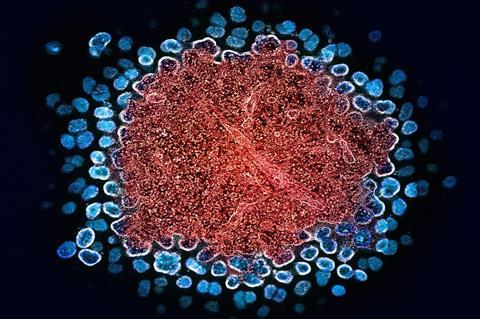Researchers from the Institute of Human Virology (IHV) at the University of Maryland School of Medicine have discovered how a specific type of immune cell may contribute to the persistence of HIV infections. The finding offers new insight into why the virus remains difficult to cure even with effective antiretroviral therapy.

The study was published earlier this month in Science Translational Medicine. It was led by Guangming Li, PhD, and Lishan Su, PhD, Professor of Pharmacology at UMSOM and Director of the Division of Virology, Pathogenesis and Cancer, and Interim Director of the Division of Immunotherapy at IHV.
The researchers focused on plasmacytoid dendritic cells (pDCs)—a rare immune cell type crucial in the body’s early defense against viruses. During chronic HIV infection, these cells become overactivated, driving continuous immune inflammation. This constant activation weakens virus-fighting T cells and allows HIV to persist in hidden reservoirs.
READ MORE: Researchers uncover HIV mystery that could unlock the path to a cure
READ MORE: Temporary benefit for immune system in early HIV treatment, but dysregulation returns
Using humanized mouse models and blood samples from people living with HIV, the team found that reducing overactive pDCs helped restore antiviral T cell function and shrink the viral reservoir. When this approach was combined with an immune checkpoint inhibitor—a therapy that reinvigorates exhausted immune cells—the immune response improved even further.
Immune control
The findings reveal that while the pDC-interferon pathway is essential for antiviral defense, its overactivation may weaken immune control of HIV. This helps explain why immune inflammation continues in people with HIV despite treatment and why a cure remains elusive.
“This study represents our decade-long effort to understand the complex role of pDCs in HIV-associated diseases,” Dr. Su said. “Our research shows that the immune system’s continued effort to fight infection can sometimes work against itself. By rebalancing this system, we may be able to open new pathways for therapy.”
Blood samples
While most of the study was conducted in laboratory and animal models, key observations were confirmed in blood samples from people living with HIV.
“Future studies will determine whether temporarily adjusting these immune cells can safely improve immune balance and contribute to HIV cure strategies,” said Dr. Li.
This research builds on UMSOM and IHV’s longstanding commitment to advancing HIV biology and developing new therapeutic strategies.
Mr. Yaoxian Lou, PhD candidate of Microbiology & Immunology at UMSOM, Drs. Shyamasundaran Kottilil and Poonam Mathur at IHV/UMSOM are coauthors of the manuscript. Other co-authors on the study include researchers at the University of North Carolina at Chapel Hill and Weill Cornell Medicine. The study was supported by NIH grants (AI136990, CA298839), the National Cancer Institute Cancer Center Support Grant (P30CA134274), and a University of Maryland School of Medicine grant (1UL1TR003098).







No comments yet